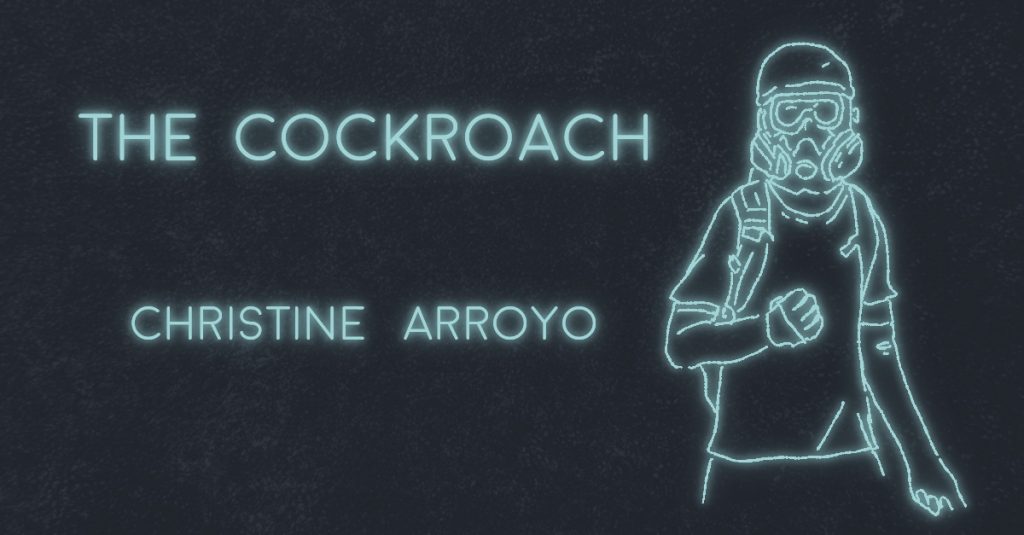She woke up in a classroom. Chalkboard at her head, corkboard at her feet. As she adjusted to the dusk light—was it 5 a.m. or 5 p.m.?—she discovered she wasn’t in the setting of a recurring dream she’d been having. The ‘I fell asleep at the desk and missed the most important test of a lifetime’ dream. No, she was in a hotel room. The Eaton. The card pinned to the corkboard wall held her personalized key to the rooftop gym.
As she pressed her body against the hotel room window, the humidity moved through the glass and brushed up over her skin. She was alone. She normally lived with two bulldogs and no humans. She remembered London. Cold, foggy, lonely London.
Hunger motivated her into the hallway. Brass elevator buttons reflected a Damien Hirst cow sculpture dissected with preserved butterflies and behind that a never-ending ticker tape scrolling the words: “A More Just World Where We Are All Liberated To Be Our Truest Selves” – Jenny Holzer, American, born 1950.
She remembered the mooncakes smashed into dirty water at the sidewalk’s edge and Tiger Balm in the storefront. She couldn’t remember how she got back in the hotel room. This is what jetlag will do, she thought to herself. She traveled all the time, her body in one place, her soul delayed four airports behind.
She stepped inside the glass elevator that was housed in a glass tower, the windows revealing rolling mountains of Kowloon beyond and red double-decker buses powering through the streets. Neon signs flashing Cantonese words stuck out from deteriorating buildings like brightly colored marshmallows at the end of burnt sticks. Hong Kong. She remembered Cha Chaan Teng, incense at the temple, “Shark Fin Soup Makes Your Penis Small” scratched into the wall as crude street art.
“Good evening, Miss Melinda.”
The hotel staff was gracious, their uniform hoodie sweatshirts and spiked hairstyles offering a unified vision of a curated and controlled counter-culture aesthetic. They knew her name. How long had she been here? She smiled as the porter held the door open for her but her concern at being unable to remember the details haunted her. Where was she headed? She didn’t even know and yet some memory beckoned her forward.
She stepped out onto Nathan Road, turning left at the intersection. She felt the stares of shopkeepers, taxi drivers, and street sweepers. The morning’s humidity made her arms sweat and her chest perspire. The store bell chimed as she stepped into a local pharmacy—one of those superstitious ones with jars of dried herbs and animal parts. She didn’t want anything endangered to rub on her skin. She just wanted a cold drink.
“You’re dressed in black.”
The shopkeeper’s judgmental tone made her stop and look down at what she’d put on to wear. A black boatneck shirt, black linen pants, and black trainers. It was what she always wore back home in London. She was colorblind. It took too long to coordinate an outfit.
“All the terrorists wear black.”
The way the shopkeeper was talking, she was starting to doubt she’d be able to buy a cold drink here.
“I’m not a terrorist.” She felt the need to clarify.
“That’s what they all say. They throw bricks and fire bombs and shut down our roads. All China wants to do is protect us. My family is Chinese. What’s wrong with the young people today?”
“I don’t know.” The little hairs on her neck spiked in worry. She didn’t want to have a political conversation. All she wanted was some cold jasmine tea bottled in a plastic bottle with an easy drink top.
“A cold drink?” She tried the direct route but the shopkeeper scowled and so she found herself trilling the store bell upon her urgent exit, walking down toward the water’s edge.
She passed the infamous Chungking Mansions. The streets were still empty. Where had she been last night? All she remembered was drinks at the Mandarin on the island side and then waking up in her hotel. How did she get back across the bay? She suddenly felt the need to smell her hair, pull at her clothes, sniffing them for anyone’s scent besides her own. A faint smell of smoke, though nothing else seemed out of the ordinary. They let people smoke in the Mandarin bar. It was all easy to explain.
She found herself leaning up against the edge of the Avenue of the Stars, looking out over Victoria Harbour. Wisps of smoke rose up in twisting curls above the HSBC building. The stillness around her made the unease she felt inside even more concerning. She turned and nearly crashed into a man bicycling past.
The flash of movement, his eyes obscured behind goggles, bombarded her. She fell to her knees. Gas masks, flames, bricks, running across crosswalks and through covered walkways. The heat, gunpowder, pepper spray all assaulting her senses. She’d been one of them. They’d called her a cockroach as they’d fired rubber bullets in her direction.
There had been many other freedom fighters around her. She suddenly thought back to the security cameras, to what she was wearing: all black, a gas mask, black cap. She’d been there too. It hadn’t been just a dream. She should have changed before heading out today. They’d be looking for her.
Her watch dinged. She pressed the text message even though it was from an unknown number. A picture of a cockroach appeared. The blankness of what she couldn’t remember made a tear roll down her cheek. If they questioned her, they’d think she was lying. Her mind struggled to find equal footing. What’s left to remember if the past is erased right in front of your eyes?

